How North Carolina's Eastern Band of Cherokee Indians is Planning for Seven Generations of Sustainability
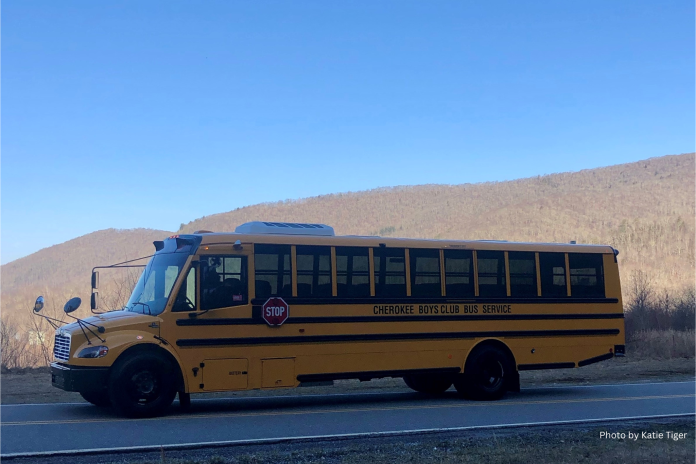
In collaboration with partners and communities, WRI’s Electric School Bus Initiative aims to build unstoppable momentum toward an equitable transition of the U.S. school bus fleet to electric, bringing health, climate and economic benefits to children and families across the country and normalizing electric mobility for an entire generation. The Electric School Bus Series shows how superintendents and fleet managers across the United States have pursued school bus electrification in their own communities. This edition covers the Eastern Band of Cherokee Indians, a sovereign nation located in Cherokee, North Carolina, whose school bus contractor – Cherokee Boys Club – and Air Quality Program teamed up for their tribe’s three-phase electric school bus pilot.
This piece is based off an interview with Donnie Owle, service manager for the Cherokee Boys Club, and Katie Tiger, Air Quality Program supervisor for the Eastern Band of Cherokee Indians.
Tribal schools and districts are prioritized and thus especially well-positioned to benefit from the Environmental Protection Agency’s (EPA) new Clean School Bus Program. The program offers $5 billion dollars over the next five years to replace existing school buses with zero- and low-emission models. Tribal schools interested in this opportunity can look to leaders like the Eastern Band of Cherokee Indians (EBCI) as a model. In March 2022, under the leadership of Katie Tiger, Air Quality Program supervisor for the EBCI, and Donnie Owle, service manager for the Cherokee Boys Club (CBC), EBCI became the first group located in North Carolina and one of the first tribal schools nationwide to procure an electric school bus.
The electric school bus serves Cherokee Central Schools, a tribally operated school system with approximately 1,300 students in grades K-12. CBC operates 20 route buses (26 total buses) for the school district, and this electric bus is just the beginning.
Motivation & Co-benefits
The EBCI’s longstanding commitment to environmental conservation was foundational for its electric school bus journey. Cherokee Central Schools has invested in myriad green practices, including the largest green building project in the region, storm water management systems and indoor air quality improvements. At the tribal-wide level, EBCI’s Tribal Council passed a resolution in October 2021 focusing on renewable energy and electric vehicles, stating that: “technological advancements and cultural supplantation has drastically changed our way of life and is altering our biosphere… the Cherokee outlook for future generations is to plan for seven generations in advance to ensure our progeny and descendants are able to enjoy the same level of opportunities in the future, or greater, and that the environment in which we occupy will be as fruitful then as it is now.”
When the Land of Sky Clean Vehicles Coalition (part of the Department of Energy’s Clean Cities Coalition Network) approached Tiger in 2019 with the idea that CBC would be a good candidate for state Volkswagen Settlement funding, she had been thinking about applying for funding for an alternative-fuel school bus through the Volkswagen Settlement’s Indian Tribe Trust. Becoming a beneficiary of the trust, however, elongated the process because some waivers required EBCI and Tribal Council approval. Using the state-level Volkswagen Settlement funds administered by the North Carolina Department of Environmental Quality (DEQ) allowed Tiger to move forward without this paperwork. While Tiger briefly considered applying for a propane bus, she knew that unlike electric buses, they still produce tailpipe emissions.
From Owle’s perspective, the decision ultimately came down to the environmental benefits and the job opportunities. Electric buses delivered both.
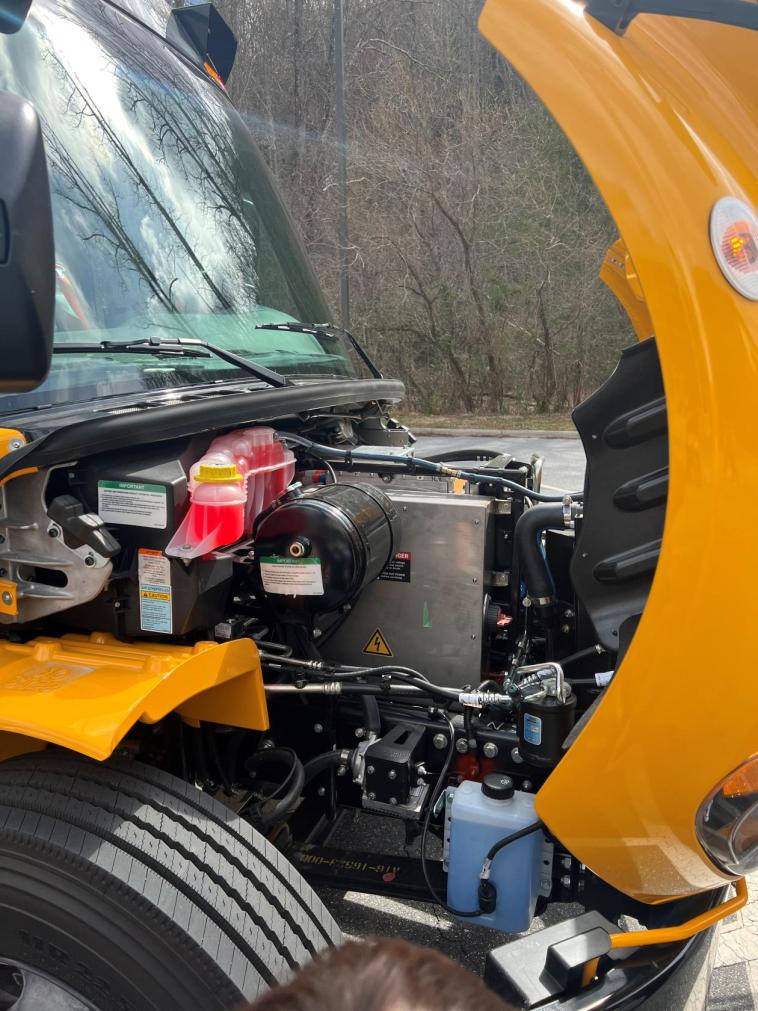
Partners & Advocates
The Land of Sky Clean Vehicles Coalition, Duke Energy and Carolina Thomas were key partners throughout the process. Guided by the Land of Sky Clean Vehicles Coalition, the EBCI Air Quality Program and CBC applied for the DEQ grant in December 2019. This funding covered the entire cost of the bus and charger, but did not cover did not cover the make-ready costs, such as the necessary electrical infrastructure between the utility grid interconnection and the chargers.
While this funding gap could have set the project back, CBC’s electric utility, Duke Energy, stepped up and provided infrastructure for the first electric school bus. When EBCI and CBC decided to apply for a Diesel Emissions Reduction Act (DERA) grant from the EPA for four additional electric buses, Duke Energy made the partnership official. The utility agreed to cover a portion of the cost of the four buses and chargers as well as infrastructure for all five buses in exchange for the district’s participation in a vehicle-to-grid (V2G) technology pilot and the rights to the battery at the end of the bus's useful life.
CBC’s 10-year relationship with Carolina Thomas, a dealer of Thomas Built Buses, has been an important part of the effort. Carolina Thomas has been quick to respond to maintenance needs and has provided three levels of electric vehicle training to its satellite dealers. Through this program, CBC completed the first two levels and will complete the third level once it receives the next five buses (see more below). With this training, CBC can now serve as a resource for electric bus knowledge for the wider region.
Implementation Status
The electric school bus pilot is currently made up of two phases totaling six buses (see Table 1). For Phase 1, CBC placed an order for its first electric school bus with Carolina Thomas in September 2021. Due to COVID-19-related supply chain delays, CBC received the bus in March 2022.
For Phase 2, CBC is working closely with Duke Energy by participating in the utility’s Vehicle-To-Grid (V2G) technology demonstration and study, which will demonstrate the ability of the bus to dispatch energy to the grid when needed. Five electric school buses will be delivered in winter 2022, and CBC’s depot upgrades currently underway would support a total of 15 electric school buses.
For Phase 3, CBC plans to apply for 14 electric school buses through EPA’s Clean School Bus Program, aiming for electrification of all 20 route buses.
| Table 1. Eastern Band of Cherokee Indians Electric School Bus Pilot - Summary | |||
| Phase 1 | Phase 2 | ||
| Status | Underway Bus delivered March 2022 | Upcoming Buses expected winter 2022 | |
| Numbers of buses | 1 | 4 | 1 |
| Type of bus | Thomas Built Buses Jouley Type C | Thomas Built Buses Jouley Type C | Thomas Built Buses Jouley Type C |
| Prices | Bus: $360,000 DC Fast Charger: $40,000 | Bus: $341,957 DC Fast Charger: $89,930 (price difference due to V2G capabilities) | Bus + DC Fast Charger + Installation Costs: $545,460 |
| Funding secured | NC DEQ Volkswagen Funding: $402,810 | EPA DERA Grant: $502,000 Duke Energy: $860,000 ($215,000 for each bus + charger); covers infrastructure (including needs from Phase 1) | None |
| Cost share | EBCI was responsible for infrastructure beyond the charger itself (later covered by Duke Energy’s support in Phase 2) | EBCI: $297,000 CBC: $60,000 | CBC covered the full price of the bus |
The Phase 1 bus, with a range of up to 138 miles, has been assigned to a 35-mile route. Given the route length, mid-day charging is not required; CBC exclusively charges the bus overnight. The bus has performed well in mountainous terrain and benefits from the regenerative braking through which the bus battery can gain range when driving downhill.
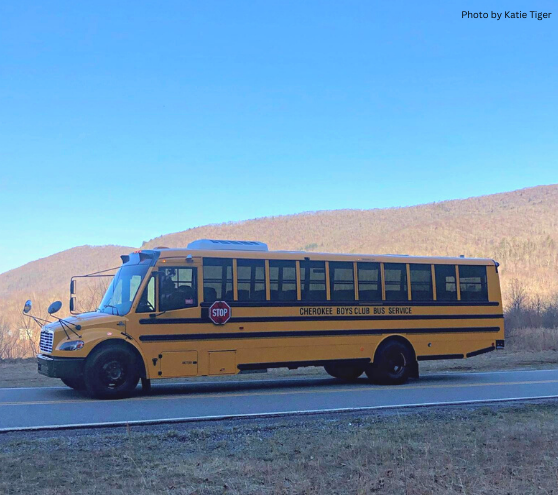
Within the first month of operation, CBC realized immediate fuel savings from the switch from diesel to electric. CBC’s fuel cost per diesel bus is typically between $700 and $900 per month. Fuel costs for the electric bus, on the other hand, were around $400 for the first month of operation. The chargers use APEX software for data tracking, and CBC plans to publish quarterly data reports in the local newspaper to share performance with the broader community.
Greatest Challenges
While leveraging different grant funding opportunities has greatly reduced the upfront cost of the five electric buses and their accompanying chargers and infrastructure, each opportunity has had its own conditions. Unlike the DEQ grant, Duke Energy’s Electric School Bus Charging program requires that school districts use buses and chargers equipped with V2G technology. The first charger CBC ordered for the DEQ grant was not V2G-capable, so CBC then ordered a second Proterra charger with a different internal platform. The two charging systems possess different components and therefore require different conduit materials, which complicated the planning process. Since CBC joined the Duke Energy program after it had already begun site planning in Phase 1, it needed to select and build out an additional site to accommodate the new chargers. CBC ordered both buses and chargers through Carolina Thomas/Proterra’s partnership to ensure they met the program requirements.
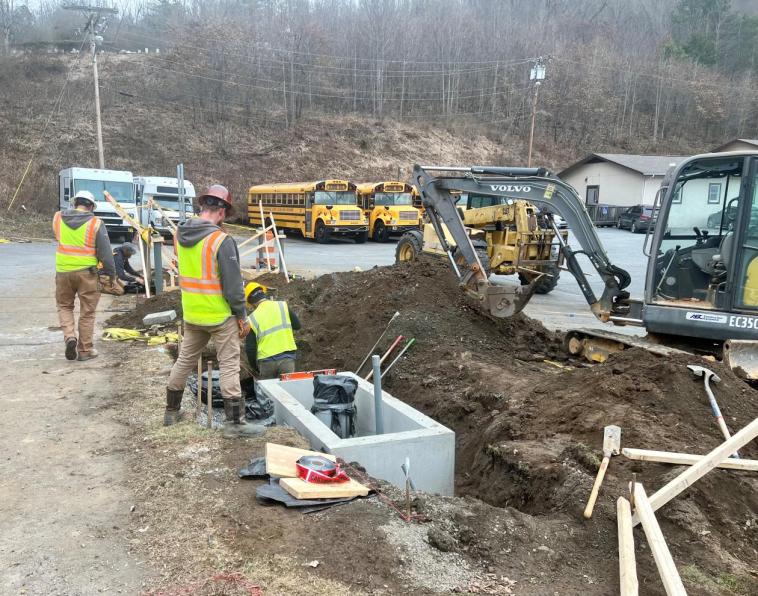
Regarding bus operations, CBC has only encountered one issue. One week after delivery, Owle found that the bus would not come online after charging. Carolina Thomas sent a team to quickly address the issue by changing the circuit board. The team remained in Cherokee for a week to make sure the issue was fully resolved.
Advice for Other School Districts
CBC and the Air Quality Program encourage others interested in transitioning to electric buses to work closely with their electric utilities and to engage their communities from the beginning. Understanding community concerns and educating residents on both benefits and challenges will help a program succeed.
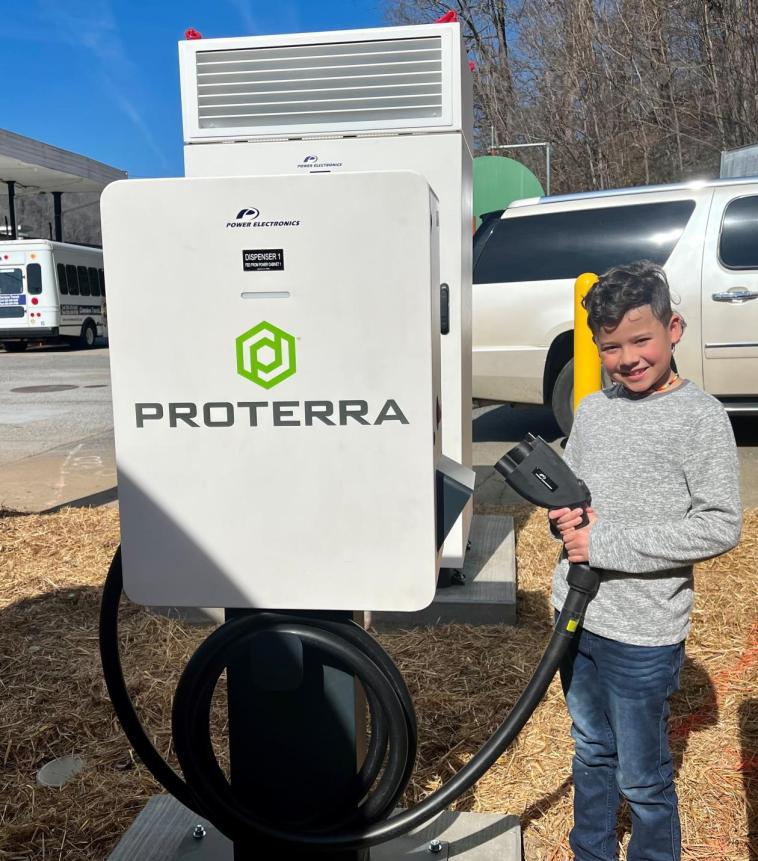
With the bus’s arrival, EBCI’s Air Quality Program conducted student learning opportunities about its environmental benefits, starting with teaching a 5th grade class at Cherokee Elementary. According to Tiger, the 5th graders “loved it,” noting how quiet it was and observing the lack of exhaust as students used handheld particulate matter sensors to measure air quality differences between the diesel and electric buses. Equipped with new knowledge, the 5th grade students presented the information to a class of pre-kindergarten students, who then made drawings of the electric bus to give to attendees at a dedication ceremony. Giving students hands-on experience with an electric school bus enables the next generation to understand the technology and foster an interest in sustainability.
Giving students hands-on experience with an electric school bus enables the next generation to understand the technology and foster an interest in sustainability.
Additional Resources
- Official Government Website of the Eastern Band of Cherokee Indians
- Cherokee Central Schools’ Green Fact Page
- Duke Energy EV School Bus Program
Want to learn more from the Electric School Bus Series? Explore more stories here.